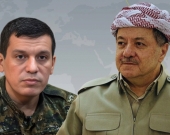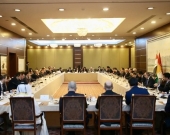Kurdistan Region’s Foreign Relations Well Below Potential

“Day-by-day, the Kurdistan Regional Government’s diplomatic relations are progressing and stability has given Kurdistan an opportunity to stand out in the Middle East for foreign investors,” noted KRG spokesman Safeen Dizai.
He said that stability, natural resources and geography were behind the Kurdistan Region’s economic boom, which has been largely responsible for the surging international interest in investments and trade in three-province enclave in northern Iraq.
Since 2003, the KRG has opened 14 representative offices around the world, and hosts 27 foreign diplomatic missions, including general- and honorary consulates and other representations in its capital, Erbil.
A Kurdish foreign relations expert told Rudaw that so far the KRG diplomatic missions or offices have not reached their full potential. “KRG diplomatic relations need ‘specialization,’ and the current status of Erbil’s relations with the other countries are very simple and primary,” he said, speaking on condition of anonymity.
According to the Iraqi constitution, the KRG and other governorates are entitled to offices inside overseas Iraqi diplomatic missions to promote cultural, social and developmental affairs.
But the KRG’s foreign representations remain unrecognized as official Iraqi diplomats and resemble quasi diplomatic missions promoting business, cultural and other ties with host countries.
In 2005, after the unification of the two Kurdish administrations, the KRG gradually integrated the existing foreign representations of the Kurdistan Democratic Party (KDP) and Patriotic Union of Kurdistan (PUK) into the Department of Foreign Relations, which functions as the KRG’s Foreign Ministry.
According to the expert, the KRG must establish diplomatic relations with countries that have poor relations with Baghdad and vice versa. “Kurdistan and Iraq have two opposing national security interests despite the fact Erbil and Baghdad are within one country,” he noted.
Critics charge that only the KDP and PUK know the agendas of the meetings KRG officials hold in foreign countries and that they do not share the details with other parties.
KRG’s Department of Foreign Relations was founded in 2006 to establish the KRG’s foreign relations with the international community as well as to promote business, trade and investment in the Kurdish enclave.
According to Dizayee, Kurdistan’s enormous natural resources help boost the geopolitical significance of Kurdistan and its relations with other countries.
“Kurdistan has been able to take its place on the international energy map,” said Dizayee. This has attracted many companies and investors to the region, he added.
The KRG has signed production-sharing agreements with more than 50 international oil companies, bringing approximately $10 billion in investments into its energy sector. The Kurdish enclave’s oil reserves are estimated at 45 billion barrels.
RUDAW












